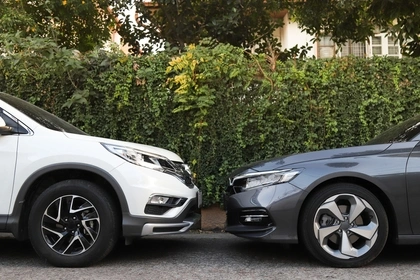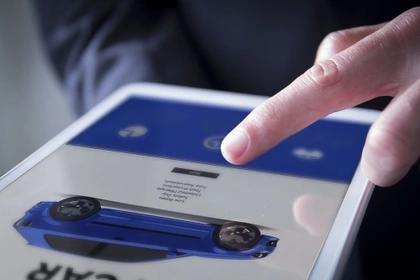Third-party
Third-party is the minimum car insurance needed to drive in the UK, by law. This type of insurance covers costs relating to another person’s car or property - if you are at fault.
Pros:
- This can be (but not always) the cheapest type of insurance available
- If you’re a new driver, this can seem appealing due to the lower premium
- If you don’t have to worry about the cost of your own vehicle, it could be an option
Cons:
- This doesn’t cover any of your own costs - including vehicle damage, loss of earnings or any injury assistance
- If you’re deemed as responsible for the accident, it would be down to you to cover all costs
- This type of insurance won’t cover other potential issues - like fire or car theft
Third-party, fire and theft
This includes your basic third-party cover, with some extras. You will still be responsible to cover any costs relating to your own vehicle if you’re found at fault for an accident.
Pros:
- If your car catches fire, is broken into or stolen then you can claim on this type of insurance
- This option is often cheaper than comprehensive - and can sometimes actually be cheaper than just third-party insurance too
- If you don’t have to worry about the cost of your own vehicle, it could be an option
Cons:
- Similar to third-party insurance, it won’t cover any of your own costs - including vehicle damage, loss of earnings or any injury assistance
- If you caused an accident, you would be liable for the costs
Comprehensive cover
Comprehensive insurance adds another layer on top of third-party, fire and theft. It will include the cost of repairing your own vehicle, even if you are at fault.
Pros:
- Covers repair costs for your own car, even if you cause the accident
- Even though it can sometimes be the most expensive, it’s not always. Sometimes fully comprehensive cover can be the best value - especially for drivers with several years’ no claims
- You have better peace of mind - knowing your costs are covered if the worst happens
Cons:
- “Fully comp” doesn’t mean everything’s included. You may have to pay more for add-ons like a courtesy car, for example.
- You can opt to have excess or not - so there may be a certain amount you have to pay towards your own costs (but your overall premium will be lower)
Compare car insurance policies to find the best deal for you - and see which of the three options is the cheapest.
Additional cover
Check the terms and conditions to find out what is and isn’t provided by your car insurance policy.
It may not include extras like breakdown and legal cover for example. Bear in mind that these add-ons are optional, so if you don’t need them there’s no point paying extra. But if you do think you’d benefit, they can be bolted onto your existing policy, or you can buy a stand-alone policy.
Tip: The price will vary from company to company and depends on a number of risk factors including how much mileage you do and what vehicle you drive, for example.
Read on to learn more about seven common add-ons to consider:
1. Breakdown cover
Breakdown cover gives you peace of mind if your vehicle breaks down. You won’t be left high-and-dry at the side of the road if your tyre goes flat or your engine conks out. A mechanic will either fix it there and then, or tow you to a garage.
It can cost anywhere between £25 and £200 to add on.
We suggest you shop around to find the most suitable deal. Remember, the cheapest policy isn’t always the best. Also, think about how much protection you want.
Additional features include:
- At-home breakdown - to repair your car at home
- Roadside assistance - to repair your car at the roadside
- Local recovery - to tow your car to a local garage
- National recovery - to tow your car anywhere in the UK to get it repaired
- Onward journey - covers the cost of a courtesy car or public transport, for example
- European cover - for breakdowns in Europe
You’ll also need to choose between:
- Vehicle cover: relates to a specific vehicle, and is usually the cheaper option of the two
- Personal cover: relates to you as a driver, and is not specific to any one vehicle
2. Legal cover
This covers legal costs (up to an agreed amount) if your claim is accepted and the accident wasn’t your fault. The limit could go up to around £100,000 depending on your policy, to pay for personal injury claims, or loss of income, for example.
It normally costs around £20 to £30 a year to add it on.
3. Personal accident cover
This offers you enhanced financial protection if you (and your passengers) are seriously injured or killed when driving.
Exclusions may apply, depending on factors such as the lender’s discretion, the severity of your injury and who caused the accident. For example, some insurers will only pay out upon death or permanent loss of limb or sight. Most insurers don’t include injuries caused by dangerous driving (e.g. drink driving, or not wearing a seatbelt).
4. Courtesy car cover
This allows you to request a courtesy car if yours is out of action.
Bear in mind, the offer may be subject to availability. It’s only a temporary measure and there may be a time limit on how long you can use the courtesy car for. Check the terms and conditions so you know exactly what to expect.
It typically costs about £20-£30 a year to add on.
5. Replacement key cover
This will pay for replacements without impacting your premium or no-claims bonus. Check with the insurer whether it would also contribute to the cost of transport costs (such as public transport) incurred by losing your keys.
If your keys are lost, damaged or stolen it can be expensive to replace them - £200 or more.
It costs around £15-£25 to add this feature on.
6. Wrong fuel cover
This protects you from the costs involved with misfuelling and getting your engine cleaned out. You can make a claim if you accidentally put petrol into a diesel engine, for example.
7. Windscreen cover
This pays for repairs relating to chips in your windscreen. Many comprehensive policies include this as standard, but claiming could increase your premiums and invalidate your no-claims bonus. This is why some people decide to take out standalone windscreen cover instead.
Just bear in mind that you will probably have to pay an excess. If this is similar to the cost of repairing the windscreen directly, you may not make a saving. So it’s best to weigh up the pros and cons before signing up.
Tip: Check if additional cover comes as a perk of your bank account - you may already have it.
Compare cheap car insurance quotes
- Search over 100 providers
- Quick and easy comparison tool
Disclaimer: We make every effort to ensure content is correct when published. Information on this website doesn't constitute financial advice, and we aren't responsible for the content of any external sites.




